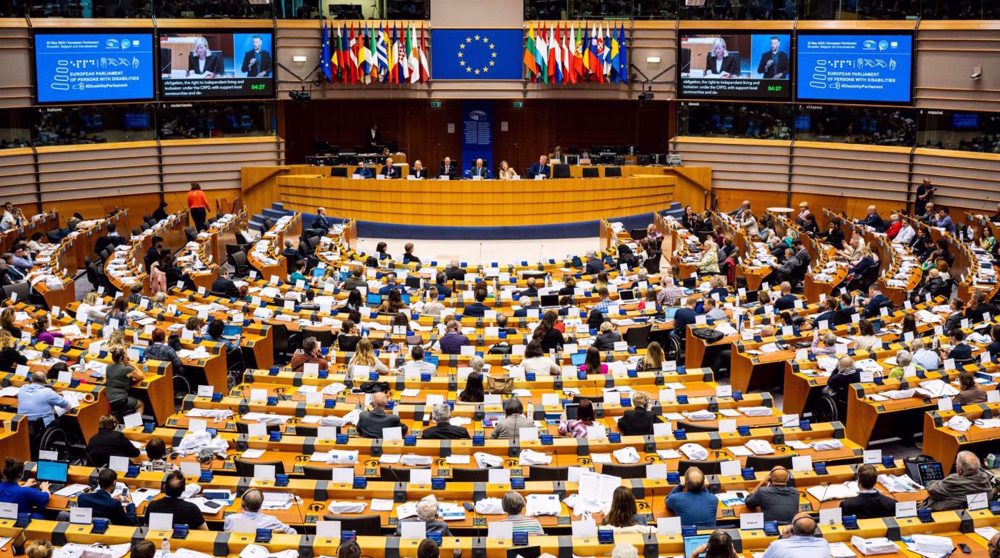Hungary treatment of refugees 'shocks' UN chief
UN Secretary-General Ban Ki-moon has voiced concern about the treatment of refugees on the border between Hungary and Serbia after Hungarian police attacked the asylum seekers.
"I was shocked to see how these refugees and migrants were treated, it's not acceptable," Ban said during a news conference on Wednesday.
He stressed that the refugees are escaping wars and persecutions in their countries and as a result, “we must show our compassionate leadership.”
"They must be treated with human dignity and human rights," the UN chief said. "That's my consistent message to European and Asian leaders."
The remarks came shortly after Hungarian police used tear gas and water cannon to disperse protesting refugees that sought to enter the country from Serbia.
Hundreds of riot police, along with special anti-terrorist units with armored vehicles and water cannon, moved towards a crowd of refugees at the Roszke border crossing on Wednesday.
Hungarian police said a group of what they called “aggressive” refugees has broken through the fence.
The Hungarian government says the clashes have left 20 policemen and two children injured.
"So far 20 policemen have been injured and ambulance services have just taken two children (to hospital) who were injured after being thrown over the security fence," the prime minister's security adviser Gyorgy Bakondi told public television.
He added that Budapest would restore and strengthen the fence, while government spokesman Zoltan Kovacs said police would not allow any refugees to break through into Hungarian territory.
Following the confrontation between the refugees and Hungarian police, Budapest called on Serbia to take action against migrants "attacking" police on their border.
Claiming that a group of “very aggressive” refugees persistently attacks Hungarian police with “rocks and pieces of concrete,” Hungarian Foreign Minister Peter Szijjarto said, “This attack is coming from Serbia, Serbian territory. Therefore, I firmly asked my Serbian colleague to call on Serbian authorities to act immediately against this aggressive group of migrants."
Serbia's Foreign Ministry later said in a statement that Hungary had informed Belgrade of ordering a 30-day suspension of the Roszke-Horgos border crossing between the two neighbors.
Serbia’s Interior Minister Nebojsa Stefanovic, meanwhile, announced plan about sending additional police to its border with Hungary and efforts to prevent refugees from approaching the border fence.
Budapest also plans to extend its border fence toward Romania in a bid to prevent the flow of refugees seeking to travel to northern Europe.
The move has angered Romania, which summoned the Hungarian ambassador to the country to express its concerns, with State Secretary George Ciamba saying in a statement the Hungarian government has failed to inform Bucharest of the plan and calling it "out of step with the spirit of Europe.”
Hungary’s Prime Minister Viktor Orban, furthermore, said in an interview with Austrian newspaper Die Presse published on Wednesday that his country would build a fence along parts of its border with Croatia.
"We have decided to build a fence also on the border with Romania," Orban said, noting, "We will also erect a fence at certain locations on the Croatian border.”
{{Gallery}}
Iraqi refugees 'expelled' for one year
This as earlier in the day, a court in Hungary has ruled for the expulsion of an Iraqi refugee from the country for one year amid a new crackdown on the influx of asylum seekers into Europe.
The court charged the Iraqi refugee, identified as Swadi Talib, with illegally crossing a border fence running along Hungary's border with Serbia.
He had crossed the fence on Tuesday, which was the first day of crackdown on the asylum seekers feeling war and execution in the Middle East and North Africa.
"This is a message to others, to potential culprits, that they should not commit this crime," said judge Krisztian Kemenes.

Europe is facing an unprecedented refugee crisis, which has escalated over the summer as refugees are coming directly to the continent instead of staying in camps in neighboring countries.
The continent is now divided over how to deal with the flood of people. Some countries like Germany have taken in a large portion of refugees, while some others including Hungary, Slovakia and Poland have refused to house the refugees and insisted on sending financial support.
Muslim refugees offered pork
Hungarian officials’ mistreatment of the refugees is not limited to the Wednesday incident as the aid agency Muntada Aid says Muslim refugees are ignored by authorities who repeatedly offer them pork.
“What we witnessed at Roszke shocked us. We saw women, children, babies and elderly people being herded into an open field where they were kept for days without shelter exposed to the cold and rain,” said Kabir Miah, overseas manager at the charity, in a testimony.
Miah added that the authorities had given Muslim refugees sandwiches that contained pork, and even after the asylum seekers refused to eat them, “More sandwiches arrived also containing pork. When one of the volunteers complained a police officer said the refugees should just remove the pork and eat the bread. He said it felt as though the police were mocking them.”
VIDEO | New national transport strike hits Italy
US to pull out troops from Chad in second African state withdrawal
Yemeni armed forces strike British oil tanker in Red Sea
VIDEO | Genocide in Gaza
VIDEO | Press TV's news headlines
VIDEO | American, Israeli rabbis call for ceasefire during protest near Gaza
Iran calls for enhanced defense cooperation with Russia
US campus crackdown: 500 pro-Palestinian protesters arrested









 This makes it easy to access the Press TV website
This makes it easy to access the Press TV website